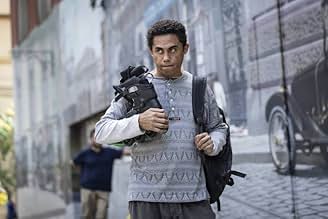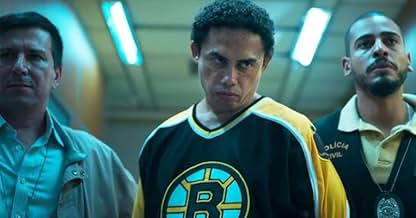The Park Maniac
- 2024
- 1h 43m
ÉVALUATION IMDb
4,9/10
1,5 k
MA NOTE
Ajouter une intrigue dans votre langueBased on a true story, an infamous serial killer, who assaulted and killed several women in the 90s, gets on a collision course with a young journalist eager for the truth and a career-chang... Tout lireBased on a true story, an infamous serial killer, who assaulted and killed several women in the 90s, gets on a collision course with a young journalist eager for the truth and a career-changing article.Based on a true story, an infamous serial killer, who assaulted and killed several women in the 90s, gets on a collision course with a young journalist eager for the truth and a career-changing article.
- Prix
- 2 nominations au total
Histoire
Le saviez-vous
- AnecdotesThe main character (Helena) is fictional. The director did this as a "historical repair" for the women who were murdered by the serial killler.
Commentaire en vedette
"The Park Maniac" hit streaming with a promise of historical redress, aiming to build a narrative centered on the impacted people and their perspectives, leaving the criminal in the background. But this noble intent doesn't really come through in the end. Instead, the film slips into a contradiction: despite the director's repeated claims in interviews that the focus would be on survivors' and families' stories, the film is drawn to explore Francisco's dark charisma, the killer. This promise of redress falls flat; the title and promotions highlight the criminal, creating expectations that are undermined on screen, where the focus frequently shifts back to the actions of the maniac, who's being tracked by a fictional journalist-the real protagonist-rather than on the aftermath for his victims. As a result, what could have been a tribute to the memory of the murdered women instead turns into a film that wavers between respect and exploitation.
Maurício Eça attempts a critique of sensationalist journalism through the young reporter Elena (Giovanna Grigio), who would theoretically bring a female perspective on the tragedy. But Elena's character is weak: she's little more than a caricature of 90s journalism, capturing only superficial, stereotyped aspects. Instead of a well-rounded character who could guide us through a newsroom filled with ethical conflicts, she's portrayed as the "ideal journalist," facing a toxic environment in a predictable, almost didactic way. This setting, dominated by grotesque male figures, ends up as a distorted mirror of a real issue but represented in such a limited way that it borders on cartoonish. The film clearly wants to take a stand against toxic journalism, but by creating shallow and predictable characters, it ends up diluting any impactful critique of media sensationalism or sexism.
This didactic tone peaks with the introduction of Martha (Mel Lisboa), Elena's sister. As a psychologist, she's reduced to a two-minute monologue explaining "what psychopathy is" in simplistic terms, like a walking encyclopedia just rattling off information. Instead of adding a deeper, human perspective, her character feels more like a manual entry, underutilizing a talented actress and missing the chance to delve into the complexities of psychopathy. The script opts for the cliché that equates mental disorders with crime, perpetuating stereotypes and limiting the discussion on the roots of violence-an essential topic in true-crime productions.
The violent scenes, a controversial aspect since the film's release, reflect this project's moral ambiguity. Rather than restricting violence to what's essential for the story, the director chooses explicit scenes that leave the audience uncomfortable. These moments are reminiscent of the media spectacle the film claims to criticize, bringing to the screen the same sensationalized image that has already scarred viewers who follow such cases. Even though rape scenes are omitted, the way violence is depicted suggests that "realism" must be shocking and graphic. This choice, however, places the film on delicate ethical ground, especially considering it deals with a real and recent case in collective memory. Instead of sensitizing viewers to the impact of the crimes, the film reduces victims to harsh and insensitive images, leaving audiences to question the necessity of these scenes.
Despite the focus on victims in the marketing, the narrative often shifts back to the criminal himself. Silvero Pereira, who plays Francisco, is, in fact, the only actor able to bring out the nuances of his character. His performance captures a man torn between an apparent normalcy-the everyday delivery guy-and the predatory nature of the killer. He navigates these two sides with notable skill, highlighting the paradox between the ordinary and the monstrous. Meanwhile, Giovanna Grigio's portrayal of Elena has moments of intensity, especially in scenes where she confronts her newsroom's toxic environment, reflecting the charged, sensationalist world of journalism. But her talent is limited by a shallow character arc that doesn't allow her to fully explore her emotional layers or inner struggles in a satisfying way.
It's clear that "The Park Maniac" drew inspiration from works like "Silence of the Lambs," which explores the psychological and emotional impact of an investigation on those involved. But unlike Jonathan Demme's film, Elena's journey here is riddled with easy solutions and predictable outcomes, resulting in a shallow narrative. Her ethical dilemmas and challenges lack depth and are resolved without much effort, diminishing the strength of her supposed "victory." The climax, where Elena leaves the newsroom in a supposedly triumphant exit, feels artificial. Though visually designed to be memorable, it comes off as a flashy but empty gesture, more focused on aesthetics than on genuinely resonating with the audience, draining the scene of any impact it might have had.
In the end, "The Park Maniac" gets stuck in uncomfortable ambiguity, unsure whether it wants to critique sensationalism or perpetuate it. By trying to give equal weight to both the criminal and the protagonist, the film loses its initial purpose of honoring the victims, delivering a narrative that seems uncertain about its own morality. What could have been a respectful homage ends up becoming just another chapter in the morbid spectacle it tries to denounce.
Maurício Eça attempts a critique of sensationalist journalism through the young reporter Elena (Giovanna Grigio), who would theoretically bring a female perspective on the tragedy. But Elena's character is weak: she's little more than a caricature of 90s journalism, capturing only superficial, stereotyped aspects. Instead of a well-rounded character who could guide us through a newsroom filled with ethical conflicts, she's portrayed as the "ideal journalist," facing a toxic environment in a predictable, almost didactic way. This setting, dominated by grotesque male figures, ends up as a distorted mirror of a real issue but represented in such a limited way that it borders on cartoonish. The film clearly wants to take a stand against toxic journalism, but by creating shallow and predictable characters, it ends up diluting any impactful critique of media sensationalism or sexism.
This didactic tone peaks with the introduction of Martha (Mel Lisboa), Elena's sister. As a psychologist, she's reduced to a two-minute monologue explaining "what psychopathy is" in simplistic terms, like a walking encyclopedia just rattling off information. Instead of adding a deeper, human perspective, her character feels more like a manual entry, underutilizing a talented actress and missing the chance to delve into the complexities of psychopathy. The script opts for the cliché that equates mental disorders with crime, perpetuating stereotypes and limiting the discussion on the roots of violence-an essential topic in true-crime productions.
The violent scenes, a controversial aspect since the film's release, reflect this project's moral ambiguity. Rather than restricting violence to what's essential for the story, the director chooses explicit scenes that leave the audience uncomfortable. These moments are reminiscent of the media spectacle the film claims to criticize, bringing to the screen the same sensationalized image that has already scarred viewers who follow such cases. Even though rape scenes are omitted, the way violence is depicted suggests that "realism" must be shocking and graphic. This choice, however, places the film on delicate ethical ground, especially considering it deals with a real and recent case in collective memory. Instead of sensitizing viewers to the impact of the crimes, the film reduces victims to harsh and insensitive images, leaving audiences to question the necessity of these scenes.
Despite the focus on victims in the marketing, the narrative often shifts back to the criminal himself. Silvero Pereira, who plays Francisco, is, in fact, the only actor able to bring out the nuances of his character. His performance captures a man torn between an apparent normalcy-the everyday delivery guy-and the predatory nature of the killer. He navigates these two sides with notable skill, highlighting the paradox between the ordinary and the monstrous. Meanwhile, Giovanna Grigio's portrayal of Elena has moments of intensity, especially in scenes where she confronts her newsroom's toxic environment, reflecting the charged, sensationalist world of journalism. But her talent is limited by a shallow character arc that doesn't allow her to fully explore her emotional layers or inner struggles in a satisfying way.
It's clear that "The Park Maniac" drew inspiration from works like "Silence of the Lambs," which explores the psychological and emotional impact of an investigation on those involved. But unlike Jonathan Demme's film, Elena's journey here is riddled with easy solutions and predictable outcomes, resulting in a shallow narrative. Her ethical dilemmas and challenges lack depth and are resolved without much effort, diminishing the strength of her supposed "victory." The climax, where Elena leaves the newsroom in a supposedly triumphant exit, feels artificial. Though visually designed to be memorable, it comes off as a flashy but empty gesture, more focused on aesthetics than on genuinely resonating with the audience, draining the scene of any impact it might have had.
In the end, "The Park Maniac" gets stuck in uncomfortable ambiguity, unsure whether it wants to critique sensationalism or perpetuate it. By trying to give equal weight to both the criminal and the protagonist, the film loses its initial purpose of honoring the victims, delivering a narrative that seems uncertain about its own morality. What could have been a respectful homage ends up becoming just another chapter in the morbid spectacle it tries to denounce.
- heyflp
- 25 oct. 2024
- Lien permanent
Meilleurs choix
Connectez-vous pour évaluer et surveiller les recommandations personnalisées
Détails
- Date de sortie
- Pays d’origine
- Site officiel
- Langue
- Aussi connu sous le nom de
- El maníaco del parque
- société de production
- Consultez plus de crédits d'entreprise sur IMDbPro
- Durée1 heure 43 minutes
- Couleur
Contribuer à cette page
Suggérer une modification ou ajouter du contenu manquant

Lacune principale
What is the Canadian French language plot outline for The Park Maniac (2024)?
Répondre




































